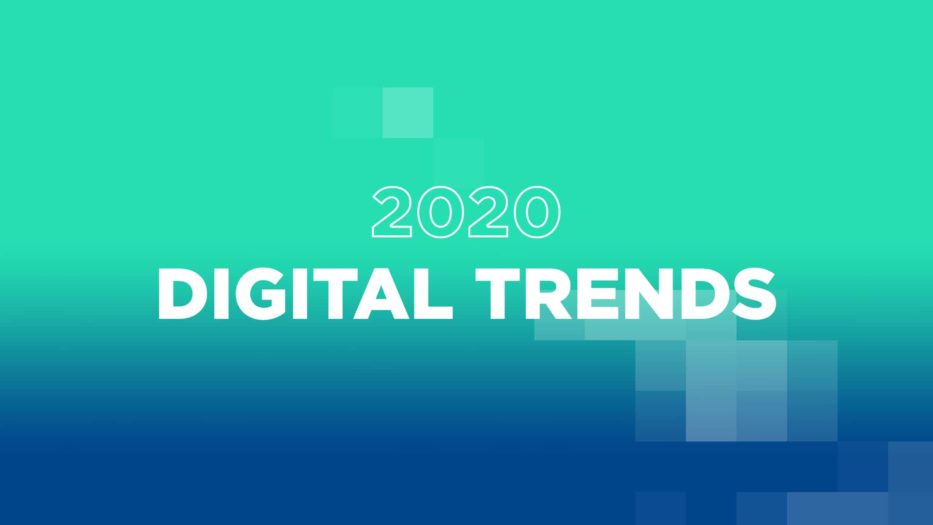3 important digital marketing trends for 2020
Insight

February has seemed to come around in the blink of an eye so we can safely say the new decade is firmly in motion. With the new year comes a whole host of changing consumer behaviours, new technologies and industry trends that are set to disrupt digital marketing in 2020.
The digital marketing landscape is constantly changing. So, to help you stay ahead of the curve, we’ve outlined 3 trends that we believe will help to shape the year ahead.
1. Sonic Branding
What may initially sound like a complex concept, is essentially the sounds or jingles you associate with brands. In turn, these sounds carry an extensive emotional value which connects audiences with the brand just as much as the accompanying visual elements do.
Whether you’re making a purchase with a brand, seeing their ad on TV or viewing their Instagram story, creative, effective and consistent audio is becoming more important than ever.
A compelling sound, alongside the right logo or graphic, sets your brand apart. One benefit of sonic branding is that music and sound can be powerful tools for encouraging people to engage with your brand. A Facebook study established that 80% of stories with voiceover or music drove better lower-funnel results when compared to ads without sound. In the cluttered, fast-paced environment that is social media where attention spans are depleting, ads that resonate with audiences will have the best chance of standing out and being remembered.
Whether it’s McDonald’s “I’m loving it”, AOL’s “You’ve Got Mail” or the latest industry heavyweight exploring their sonic identity Mastercard, sonic branding is a valuable addition to a marketing and brand strategy.
2. CX Leadership
Customer experiences (CX) have previously been seen to divide marketing, which has resulted in two worldviews: those who focus on the past and those who focus on the future. Two companies could be almost identical, but yet face different threats to growth because of the different choices they made within strategy and investment.
For example, an Adobe study showed that 26% of mainstream companies said they fear recession, while 27% of leading companies were more concerned with attracting and retaining digital talent. Following this trend, the study showed that 36% of companies on the forefront of customer experience said they exceeded their top business goal by a significant margin in 2019, compared with only 12% of mainstream companies. Furthermore, it revealed that these businesses with a customer-first model are three times as likely to have significantly exceeded their 2019 top business goal in 2020.
As shown, the biggest benefit to leading in CX is financial. Their success supports the essential case for a customer-led approach and the foundation of customer experience today is to look to the future and create compelling content.
An essential element is content intelligence. Artificial intelligence (AI) and more specifically, machine learning (ML) is increasingly becoming a marketers best friend when it comes to connecting content with data and analytics to discover patterns, trends, offer actionable insights and create authentic one-to-one experiences.
3. Personalisation
Personalisation isn’t a new thing. However, in order to improve existing customer relationships and have the ability to reach new ones, personalising your marketing strategy is the key to standing out in 2020. Whether it be your content, advertisements or emails, a tailored experience is going to acquire and engage your audiences.
2020 not only urges marketers to understand their customer’s needs but also improve their journey across various touchpoints. Journey management and valuable personalisation depend on identifying and serving the individual, in real-time and at any scale.
The implementation of AI is continuing to grow as marketing leaders want to use artificial intelligence to continuously improve customer experience and are essential for personalisation, where the mix of customer information and contextual data can power AI/ML systems to provide a unique experience at an individual level.
Through AI and the accessibility of big data understanding, your customer’s pain points and desires throughout their journey now take a fraction of the time.
When analysing the power of personalisation, at the forefront of most people minds would be Netflix with their customised recommendation system. However, there are other companies that are currently, successfully using personalisation. For example, Starbucks uses a gamified mobile app that integrates the brand’s rewards system with the ability to customise and order drinks via the app using information such as purchase history and location to make the experience as personalised as possible.
In today’s world, the number of options available for consumers can be overwhelming. Using personalised marketing to its full potential via data-driven campaigns can enable you to stand out among the noise and provide the solutions your customers are looking for.